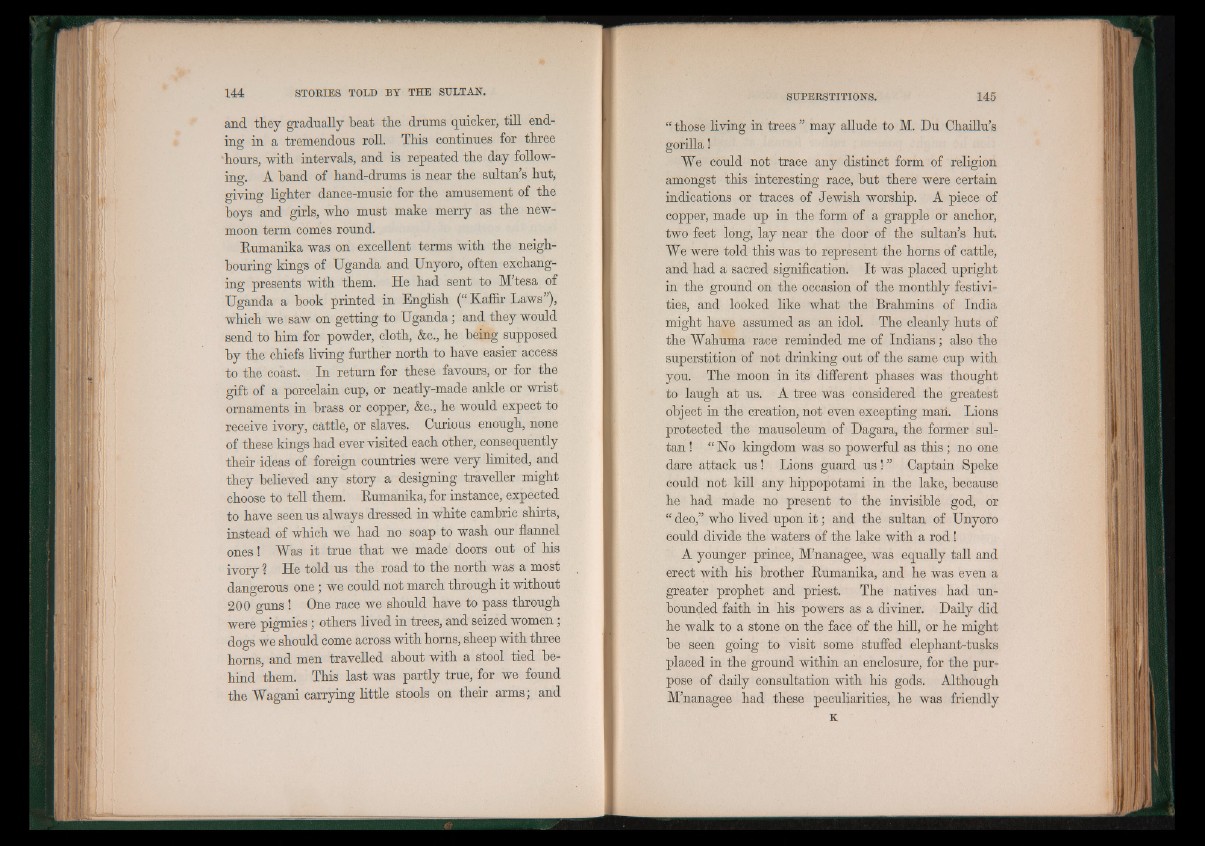
and they gradually beat the drums quicker, till ending
in a tremendous roll. This continues for three
hours, with intervals, and is repeated the day following.
A hand of hand-drums is near the sultan’s hut,
giving lighter dance-music for the amusement of the
hoys and girls, who must make merry as the new-
moon term comes round.
~R.iTma.nika. was on excellent terms with the neighbouring
kings of Uganda and Unyoro, often exchanging
presents with them. He had sent to M’tesa of
Uganda a book printed in English (“ Kaffir Laws”),
which we saw on getting to Uganda ; and they would
send to him for powder, cloth, &c., he being supposed
by the chiefs living further north to have easier access
to the coast. In return for these favours, or for the
gift of a porcelain cup, or neatly-made ankle or wrist
ornaments in brass or copper, &c., he would expect to
receive ivory, cattle, or slaves. Curious enough, none
of these kings had ever visited each other, consequently
their ideas of foreign countries were very limited, and
they believed any story a designing traveller might
choose to tell them. Rumanika, for instance, expected
to have seen us always dressed in white cambric shirts,
instead of which we had no soap to wash our flannel
ones ! Was it true that we made doors out of his
ivory ? He told us the road to the north was a most
dangerous one ; we could not march through it without
200 guns ! One race we should have to pass through
were pigmies ; others lived in trees, and seized women ;
dogs we should come across with horns, sheep with three
horns, and men travelled about with a stool tied behind
them. This last was partly true, for we found
the Wagani carrying little stools on their arms; and
“ those living in trees ” may allude to M. Du Chaillu’s
gorilla!
We could not trace any distinct form of religion
amongst this interesting race, but there were certain
indications or traces of Jewish worship. A piece of
copper, made up in the form of a grapple or anchor,
two feet long, lay near the door of the sultan’s hut.
We were told this was to represent the horns of cattle,
and had a sacred signification. It was placed upright
in the ground on the occasion of the monthly festivities,
and looked like what the Brahmins of India
might have assumed as an idol. The cleanly huts of
the Wahuma race reminded me of Indians; also the
superstition of not drinking out of the same cup with
you. The moon in its different phases was thought
to laugh at us. A tree was considered the greatest
object in the creation, not even excepting man. Lions
protected the mausoleum of Dagara, the former sultan
! “ No kingdom was so powerful as th is; no one
dare attack us ! Lions guard us ! ” Captain Speke
could not kill any hippopotami in the lake, because
he had made no present to the invisible god, or
I deo,” who lived upon i t ; and the sultan of Unyoro
could divide the waters of the lake with a ro d !
A younger prince, M’nanagee, was equally tall and
erect with his brother Rumanika, and he was even a
greater prophet and priest. The natives had unbounded
faith in his powers as a diviner. Daily did
he walk to a stone on the face of the hill, or he might
be seen going to visit some stuffed elephant-tusks
placed in the ground within an enclosure, for the purpose
of daily consultation with his gods. Although
M’nanagee had these peculiarities, he was friendly
K